Key takeaways:
- Rising inflation affects everyday budgeting and spending; frequent price fluctuations create financial anxiety.
- Strategies for coping include prioritizing needs over wants, embracing DIY, and staying informed on market trends.
- Personal experiences reveal the need for flexibility in financial planning and the impact of collective purchasing choices on local economies.
- Proactive financial management, such as diversifying income streams and researching investments, is essential for navigating future inflation challenges.
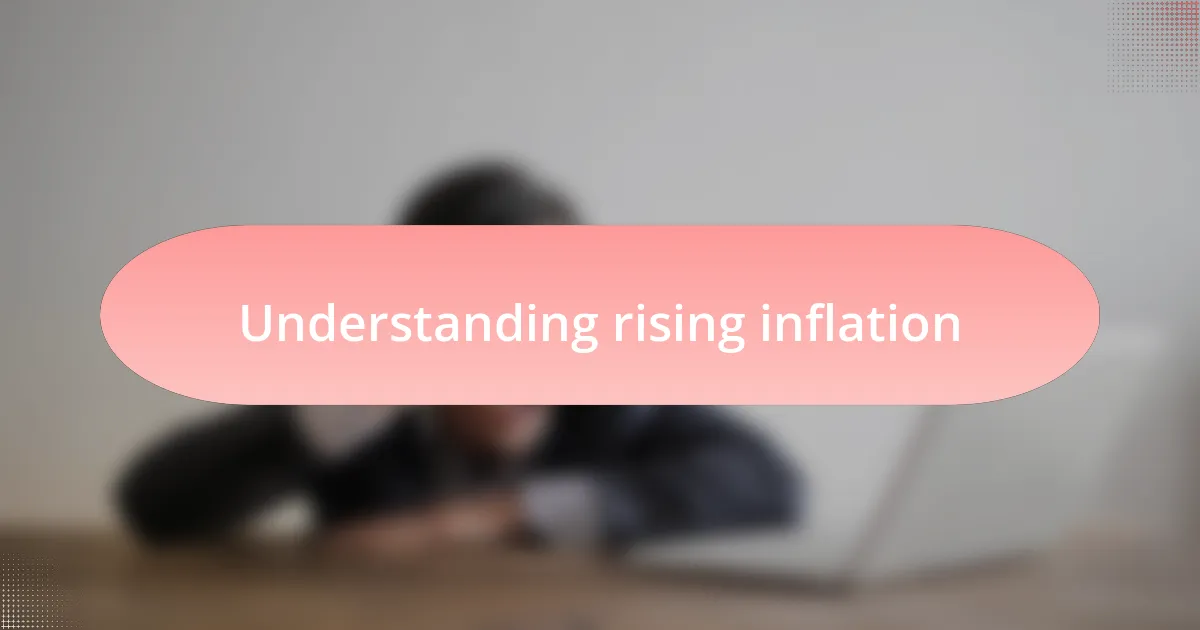
Understanding rising inflation
Rising inflation is something I’ve felt personally in my everyday life. For instance, I remember the shock of seeing my grocery bill soar unexpectedly. It’s frustrating to realize that the money I thought would stretch far enough for my needs suddenly doesn’t.
With that in mind, I’ve often wondered, what really drives inflation? From my experience, it’s not just the prices going up; it’s also about supply chain disruptions and shifts in demand. For example, when fuel prices increase, everything else—like transport and production—follows suit, impacting my wallet in myriad ways.
As I delve deeper into this topic, I’m struck by how many people may still be unaware of their power to influence prices. Have you ever considered how your purchasing choices affect local economies? Personally, I try to support local businesses whenever possible, recognizing that collective action can make a difference in stabilizing prices and promoting a healthier economic environment.
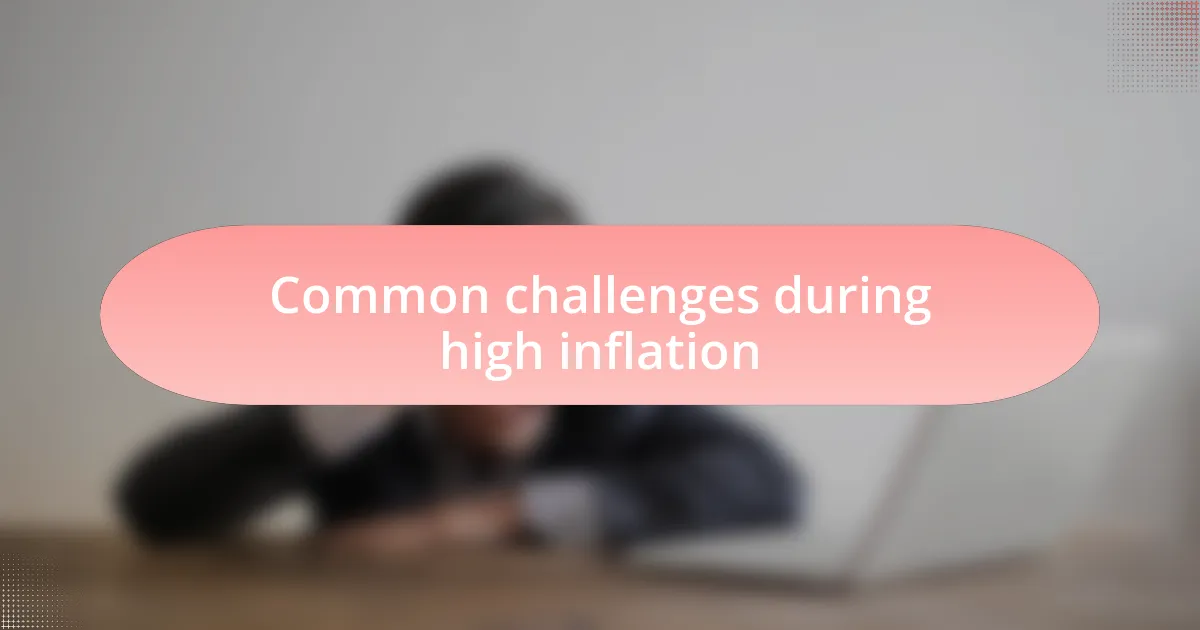
Common challenges during high inflation
High inflation often brings unexpected challenges that can be quite overwhelming. One of the biggest struggles I’ve faced is budgeting effectively; it used to be simpler when I could predict my monthly expenses. Now, with prices fluctuating constantly, I find myself revisiting my budget almost weekly, grappling with how to allocate funds for essentials without compromising my savings.
Another challenge during these times is the emotional toll. I recall a situation where I hesitated at the checkout line, debating whether to buy a product I once considered a staple. It stirred anxiety in me, questioning if I could truly afford it. The pressure to choose between necessities and desires creates a sense of urgency that weighs on my peace of mind, making even simple shopping trips feel stressful.
Additionally, the fear of not keeping up with rising living costs is palpable. I often hear friends describe a similar experience—worrying about how inflation might affect rent, fuel, and food prices in the months to come. It’s a shared anxiety that seems to linger in conversations, reflecting how deeply inflation impacts our daily lives. Have you felt a similar pressure? It’s a common thread that connects us all in today’s economic landscape.
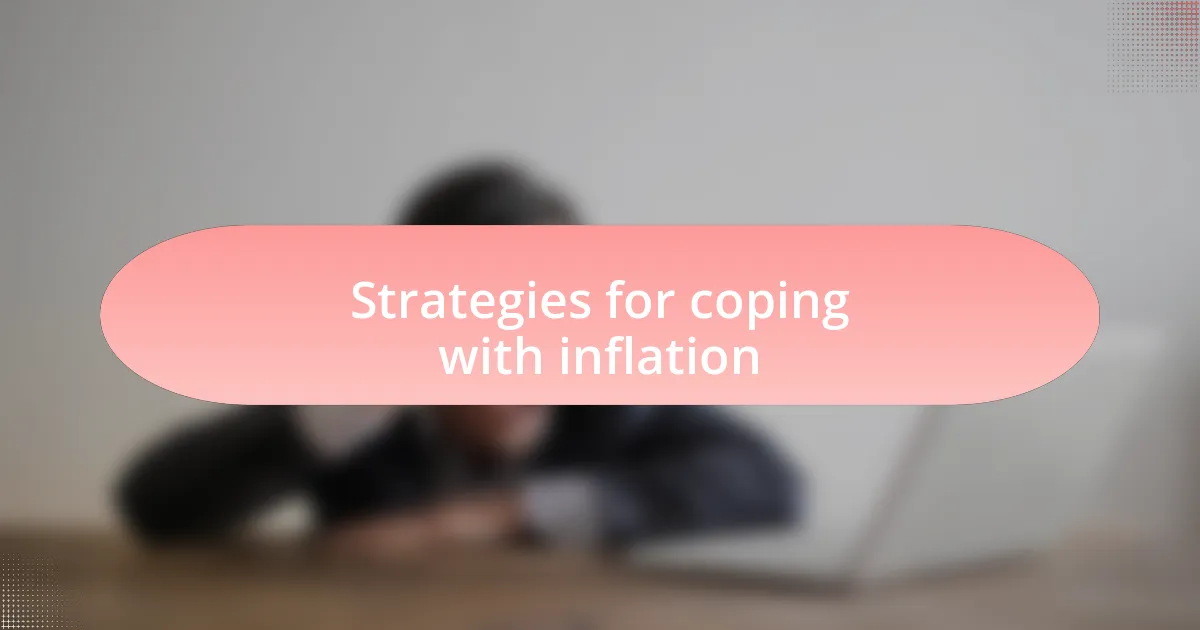
Strategies for coping with inflation
When it comes to coping with inflation, I’ve found that prioritizing my spending has been essential. For example, I now make a habit of distinguishing between wants and needs before I head to the store. It’s eye-opening to see how much I used to splurge on items that didn’t add real value to my life. Have you ever stopped to think about what truly matters in your shopping cart?
Another strategy that has worked wonders for me is embracing DIY solutions. The other day, rather than purchasing a ready-made meal, I took a couple of hours to cook a batch of hearty soup from scratch. Not only did it save money, but it also felt gratifying to create something nourishing with my own hands. Have you ever experienced that sense of accomplishment when you prepare meals at home? It’s a small victory that can make a big difference in managing costs.
Finally, staying informed has been a game-changer. I routinely peruse local news and online articles about inflationary trends and shifts in the market. This knowledge not only helps me make smarter purchasing decisions but also eases my anxiety about financial uncertainty. Have you considered how such awareness can empower you to navigate tough economic times? Understanding the bigger picture has really made a difference for me.
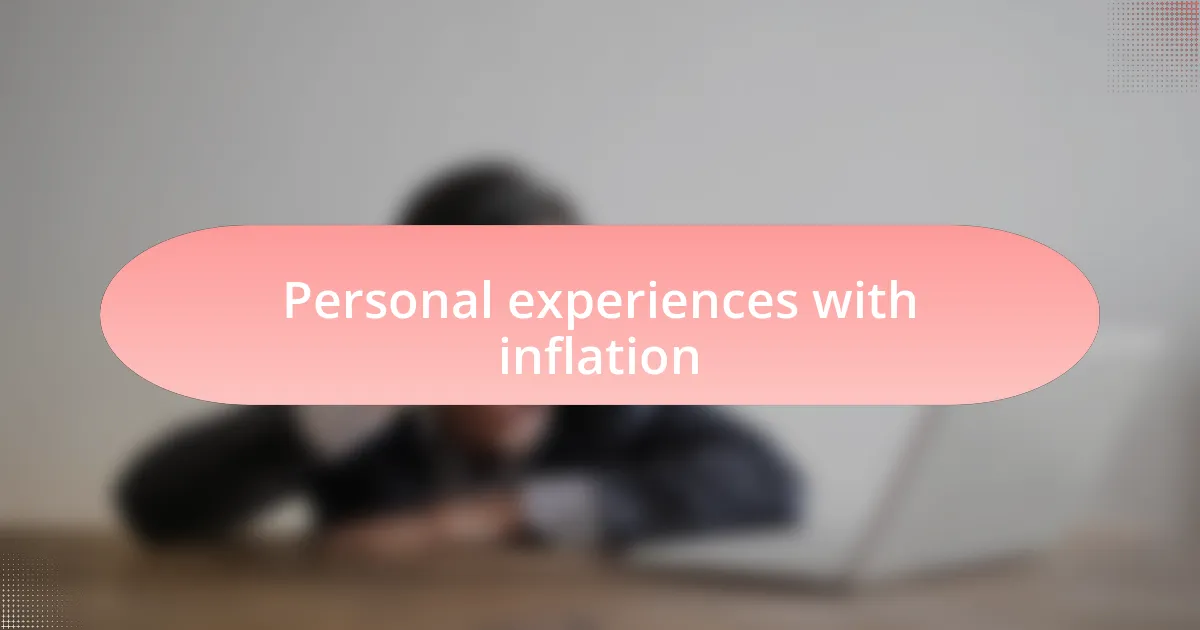
Personal experiences with inflation
Inflation has changed my relationship with budgeting quite significantly. I remember one month where I was shocked to see my grocery bill rise unexpectedly, leaving me with less money for essentials. It was a wake-up call for me; have you ever faced a moment where reality just hits you?
One vivid experience that stands out is when I had to decide between filling my fuel tank or stocking up on groceries. I chose the latter, knowing I could rely on public transport for a few days. It made me realize how interconnected our choices are in times of rising costs. Have you had to make hard choices about what to forgo lately?
Seeing small items in shops, like snacks and drinks, becoming increasingly expensive made me reflect on my previous buying habits. I once treated myself to a coffee every morning on my way to work without a second thought. Now, I’ve learned to make coffee at home, which has not only saved me money but sparked a newfound appreciation for the little moments of self-care. Has inflation altered the way you treat yourself?
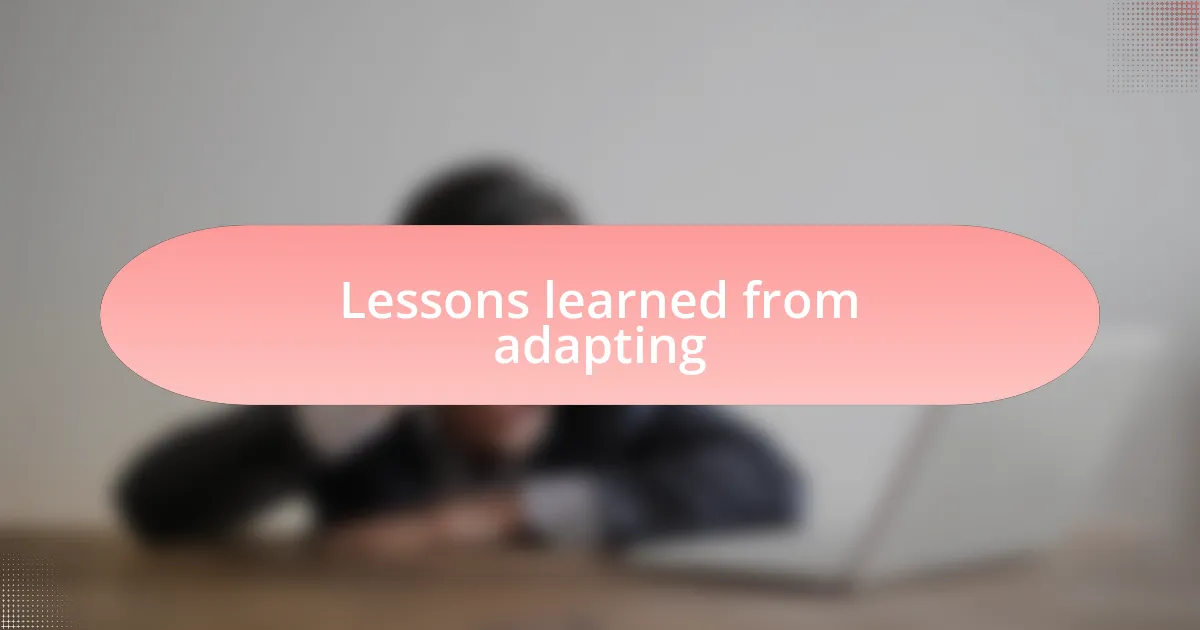
Lessons learned from adapting
Adapting to inflation has taught me the value of flexibility in my financial planning. I remember a time when unexpected repairs hit me while I was already budgeted for other expenses. That experience pushed me to create a ‘buffer’ in my budget for emergencies. Have you ever considered how a small cushion can make a huge difference during tough times?
One significant lesson I learned is to prioritize needs over wants. I used to think that upgrading my phone every year was a necessity. However, I realized that holding onto my previous model a bit longer not only saved me money, but also made me more mindful about what truly adds value to my life. Have you questioned your own spending habits in this way?
Finding alternative ways to enjoy life has also been a revelation. I used to dine out frequently, enjoying the social aspect it provided. Now, I host potlucks with friends where everyone brings a dish, fostering community and creativity. This change not only lightened my financial burden but deepened my connections. How have you found joy in adaptation?
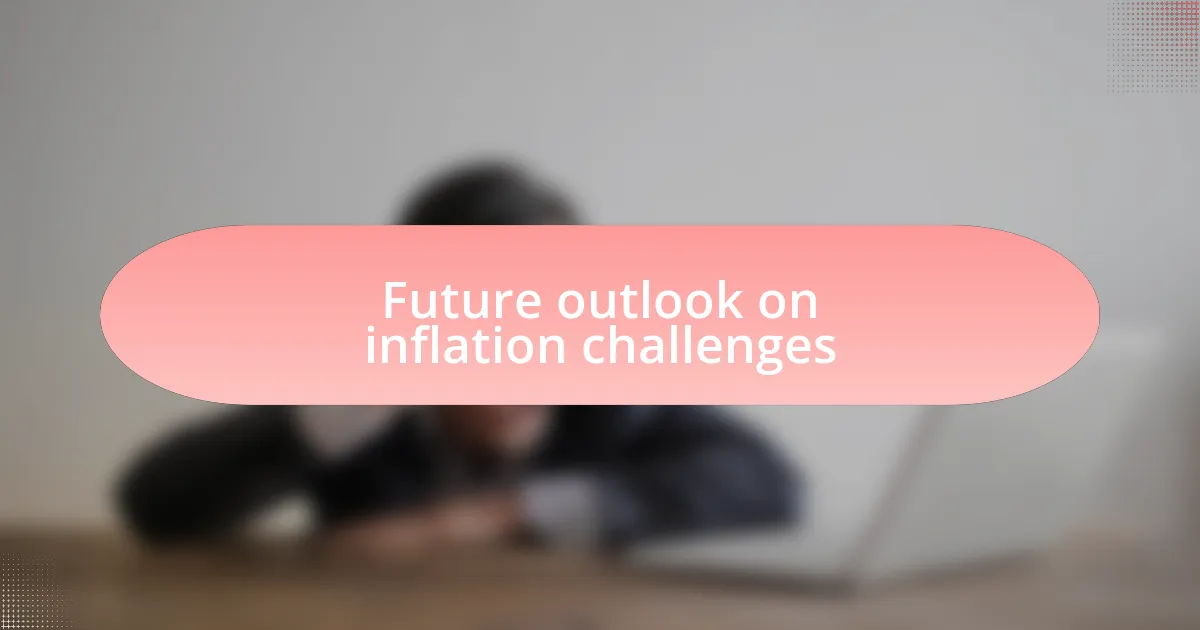
Future outlook on inflation challenges
Addressing future inflation challenges requires a proactive approach. I recently reflected on how my spending patterns have changed as a result of rising prices, and it forces me to think ahead. I’ve started to set financial goals that incorporate potential increases in everyday expenses. Have you mapped out your finances for what could lay ahead?
Looking down the road, one significant adjustment I’ve made is to diversify my income streams. I’ve found freelance opportunities that not only provide extra cash but also allow me to hone my skills. This approach has given me a sense of security and independence, knowing that I won’t be solely reliant on one source of income. How many avenues have you explored for financial resilience?
The unpredictable nature of inflation means that I constantly reassess my investments. Recently, I spent hours researching asset classes that could withstand economic fluctuations. I realized that knowledge is power when it comes to financial decisions, and having a game plan in place gives me peace of mind. Are you actively researching ways to safeguard your financial future?